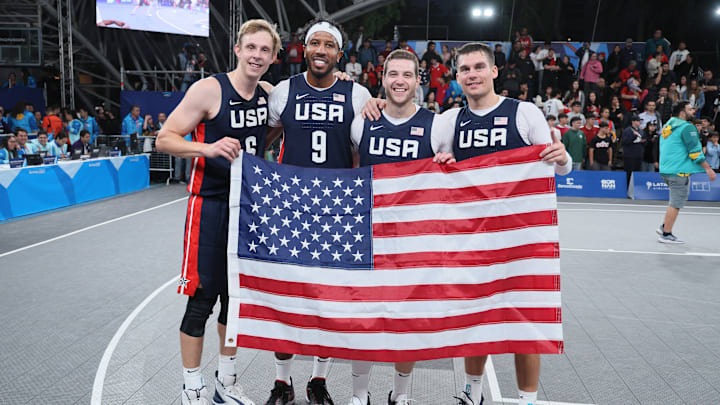James Taft "Jimmer" Fredette has always been a trailblazer in his sport. For much of his career, he was a basketball spectacle who was tragically a few years ahead of his time, dominating the attention of the basketball world during his senior season at BYU. As a recruit, Jimmer was the 2011 Naismith Player of the Year and is still viewed as one of the greatest college hoopers in history. We all know about his failure to translate his stardom to the NBA and overseas dominance, but this summer we'll get to witness Jimmer on the world's biggest stage: the Olympic Games.
That's right: Jimmer Fredette is an Olympian. Leading the charge for the first 3-on-3 basketball event in Olympic history, Jimmer Fredette will introduce the world to a brand new style of hoops; but that's nothing new for the former BYU Cougar.
Yes, Jimmer Fredette will be in the Paris 2024 Olympics 🇺🇲 pic.twitter.com/peWnPtLYXE
— FIBA3x3 (@FIBA3x3) April 7, 2024
In 2011, Jimmer Fredette was a 6'2" guard who stole the eyes of the sports world with his baffling shot range and "don't think twice" trigger. Fredette averaged 28.9 points in his senior season with BYU on nearly 40% efficiency from long range. And when I say long range, I mean long. On the playground, we had a term for shooting 3-pointers well beyond a reasonable distance: Jimmer Range.
Jimmer's dominance of the sport was against even the greatest competition in the nation, as he and the Cougars took two Kawhi Leonard's San Diego State Aztecs twice during the regular season, and dropped 49 points on an Arizona team that headlined future 2nd overall NBA Draft pick, Derrick Williams.
Stories of Jimmer's growth into the player he became became household knowledge: playing prison ball and dribbling through darkened church hallways. His individual style of 3-point reliance and unlimited range led BYU to a 3-seed in the tournament and a run to the Sweet 16.
When Jimmer was drafted to the NBA, the hype surrounding him was more fanatical than reasonable. Kevin Durant called Jimmer the "best scorer in the world" and much of the basketball world expected him to be just that as an NBA player. Drafted 10th overall to the Milwaukee Bucks and traded to the black hole of basketball success that resided in Sacramento, California.

Coaching changes and limited playing time plagued the early seasons of Fredette's career and he began to bounce around the league to a Bulls team that didn't want him, a hometown Knicks team that didn't believe in him, and even a Pelicans team that didn't use him. His ball-dominant approach to the game didn't fit his coaches' offensive schemes, and as they perceived him to be too small, too slow, and not athletic enough, Jimmer's career withered.
As Stephen Curry's 3-point barrage earned him league-wide respect, Jimmer's talents were ignored by each of his teams. I often think about what could have been if Jimmer had entered the NBA following Curry's first MVP in 2015, when the NBA game was changed forever and shooters were the most valuable assets in the sport.
Depending on how you view his move to the Chinese Basketball Association, Jimmer's move overseas was either the best or the worst thing for his career. Once again, he was dazzling packed stadiums full of fans coming to see him play. Winning the CBA MVP award and scoring a career-high 75 points in a game, Jimmer-mania was on full display in Shanghai.
His attempts to revive his NBA career were short-lived, but Jimmer wasn't one to let others end his career for him.
Jimmer is a basketball pioneer, and just as he introduced the world to 3-pointers being a primary basketball, he's now leading the charge of a new style of basketball. Jimmer has been playing 3-on-3 basketball with Team USA. His career's direction hasn't gone in the way that anyone expected, but his legacy will be remembered as a basketball trailblazer--the one who marked the path toward playing and viewing basketball in a new way.
People misunderstood Jimmer's identity. Not everyone can be Stephen Curry, and that's okay. Jimmer Fredette was never a basketball savior; he was a basketball pioneer.
